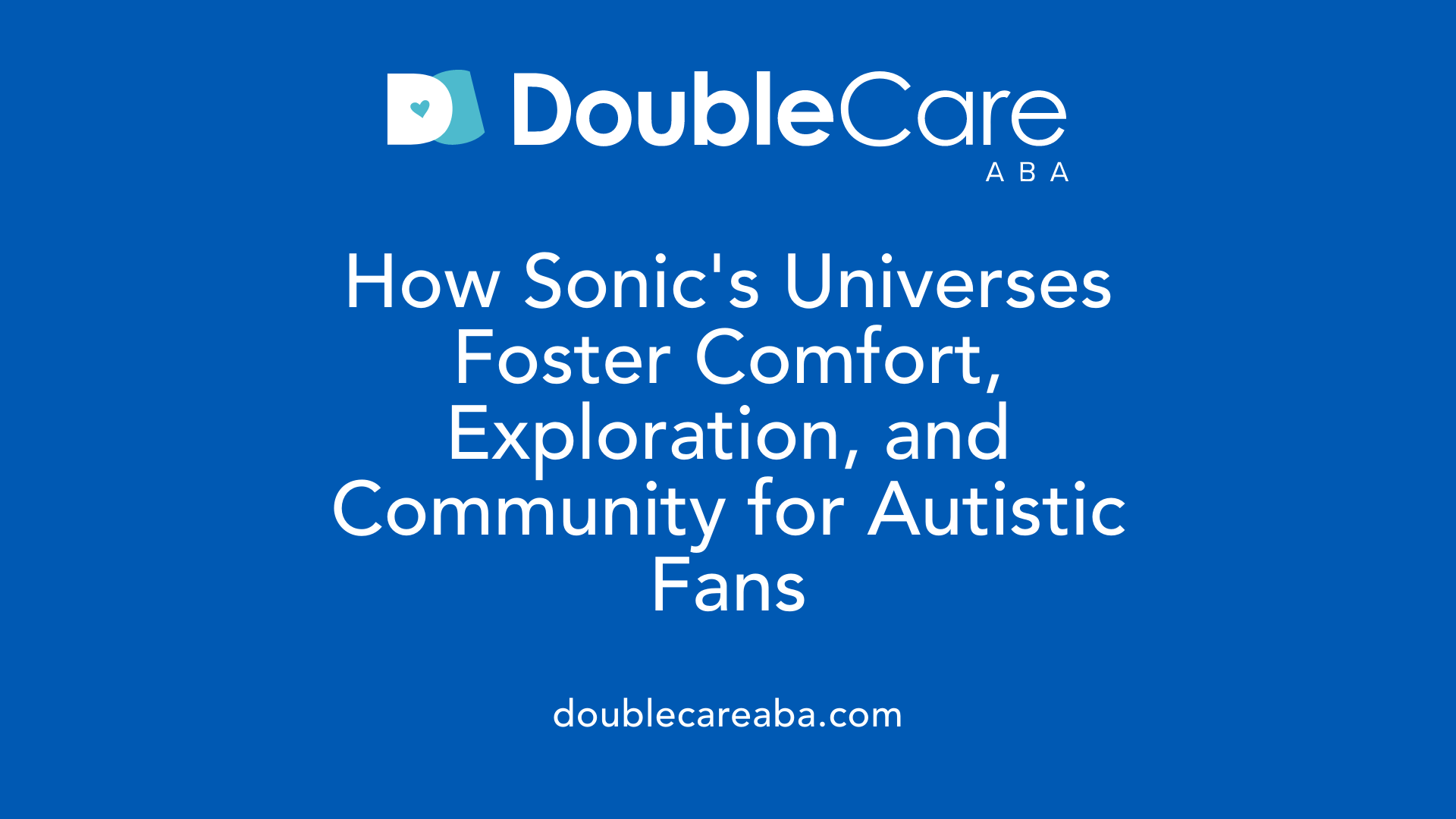Unraveling the Connection Between Autism and the Sonic Franchise
Sonic the Hedgehog has carved out a unique space within both gaming culture and autism communities. This article delves into why many autistic individuals develop a deep affinity for Sonic, examining the psychological, sensory, social, and cultural dynamics at play. From the franchise’s engaging universe to its role as a comforting and empowering presence, we explore how Sonic functions as more than just entertainment—it's a meaningful aspect of many autistic lives.
The Rich Lore and Accessibility of Sonic

The engaging universe of Sonic franchise
The Sonic franchise is renowned for its colorful characters, fast-paced gameplay, and imaginative worlds. It spans numerous media, including video games, animated series, comics, and merchandise. This expansive universe offers endless exploration opportunities, allowing fans to dive into diverse stories and backgrounds. The calming predictability within these stories and routines helps fans find comfort and a sense of familiarity, which is especially important for autistic individuals.
How Sonic media appeals to autistic interests
Many autistic fans are drawn to Sonic because of its vibrant visuals, engaging sound design, and structured gameplay. These sensory elements can be particularly soothing or stimulating, providing enjoyable sensory input. Sonic’s dynamic speed and predictable game mechanics foster immersion while offering a sense of control. Furthermore, engaging with Sonic’s universe helps develop cognitive skills such as memory recall, focus, and strategic problem-solving. Sharing this interest with a community promotes social interaction, boosting confidence and fostering friendships.
Sonic as a prominent example of a special interest
Autistic individuals often develop intense, specific interests called 'special interests,' which provide comfort, guidance, and a sense of achievement. Sonic stands out as a notable example due to its compelling characters, empowering themes, and the variety of accessible media. Sonic’s heroism, resilience, and adventurous spirit serve as sources of inspiration, enhancing self-esteem. The franchise’s consistent themes and approachable content make it a meaningful focus for many, supporting emotional regulation, cognitive development, and social connections.
| Aspect | Description | How It Benefits Autistic Fans |
|---|---|---|
| Sensory Stimulation | Visuals, sounds, and fast-paced action | Enjoyable, calming sensory input |
| Cognitive Skills | Memory, problem-solving, attention | Enhances mental abilities |
| Social Connection | Shared interests and communities | Fosters friendships and social skills |
| Emotional Support | Familiarity and positive themes | Provides comfort and confidence |
Overall, Sonic the Hedgehog offers a rich, accessible universe that appeals deeply to many autistic individuals, making it a valuable and meaningful interest that supports their emotional, cognitive, and social well-being.
Sonic’s Relatability and Empowerment

Why might autistic children be particularly interested in Sonic?
Autistic children often find Sonic the Hedgehog especially appealing due to his clear, uncomplicated yet engaging gameplay, vibrant visuals, and predictable storylines. These elements align well with their sensory preferences and their desire for structure and routine. Sonic’s world is consistent, which provides a sense of safety and control, helping children manage feelings of anxiety or sensory overload.
Interest in Sonic can also become highly focused and persistent, a common trait among autistic individuals where such passions support emotional comfort and mastery. These focused interests can enhance social bonding, especially when shared with others or integrated into therapeutic activities like OSMoSIS, a system that uses music and movement to develop social and motor skills.
Sonic’s defining traits—determination, resilience, and independence—resonate profoundly with many autistic fans. His character exemplifies strengths that inspire confidence and bolster emotional resilience.
Character traits of Sonic
Sonic is portrayed as a brave, energetic, and adventurous hero. His determination to save his friends and his resilience in facing challenges inspire admiration. His independence allows him to solve problems on his own without reliance on others, embodying qualities that many autistic individuals aspire to.
Identification and inspiration for autistic fans
Many autistic fans relate to Sonic’s adventurous spirit and his ability to overcome obstacles. Sonic’s character promotes a message of perseverance and self-belief, which can serve as a powerful symbol for individuals working through their own challenges. The franchise’s diverse cast and stories provide a sense of connection, fostering feelings of belonging and community.
Impact on self-esteem and resilience
Engagement with Sonic can boost self-esteem by highlighting qualities like bravery and problem-solving. Watching Sonic succeed or overcoming difficult levels can encourage autistic individuals to see their own potential. The empowering nature of Sonic’s heroic persona often encourages fans to believe in their capabilities, fostering resilience and emotional strength.
| Traits of Sonic | How They Inspire Fans | Impact on Self-Confidence |
|---|---|---|
| Determination | Overcoming challenges | Boosts belief in personal abilities |
| Resilience | Bouncing back after setbacks | Encourages perseverance |
| Independence | Solving problems alone | Fosters self-reliance |
Exploring Sonic’s universe provides not only entertainment but also a source of empowerment and emotional support, helping autistic individuals navigate their experiences with hope and confidence.
Sensory Stimulation Through Sonic

How does Sonic function as a special interest or source of comfort for autistic people?
Many autistic individuals find Sonic the Hedgehog to be a valuable form of comfort and a deep special interest. This is because Sonic offers familiar characters and a consistent universe that provides predictable patterns, helping to create a sense of safety. The vivid visuals and engaging sounds in Sonic games stimulate the senses in a way that is both exciting and calming.
The sensory engagement from visual effects, such as bright colors and dynamic movement, along with the auditory elements like upbeat music and sound effects, can be particularly soothing or stimulating for autistic players. Additionally, the rhythmic gameplay and routine of level progression contribute to feelings of mastery and control.
Engaging with Sonic can also serve as a form of emotional regulation. The familiar environment and joyful experiences associated with the franchise can help reduce anxiety and provide stress relief. Because the Sonic universe is predictable, it offers stability that can be very comforting for those dealing with sensory overload or social challenges.
Moreover, the franchise encourages social interaction and community building among fans, which can foster social skills and a sense of belonging. Overall, Sonic acts as a reliable source of enjoyment and comfort, helping autistic individuals navigate their sensory experiences, develop confidence, and find moments of joy amid their everyday challenges.
The Psychological and Emotional Benefits of Sonic
How does Sonic function as a special interest or source of comfort for autistic people?
Sonic the Hedgehog is more than just an entertaining franchise for many autistic individuals; it serves as a meaningful source of comfort and a special interest. The appeal lies in Sonic’s familiar characters, predictable storylines, and stimulating visuals and sounds, which foster a sense of safety and enjoyment.
Engaging with Sonic allows autistic people to explore their passions in a structured environment. The franchise offers opportunities for mastery and self-expression, which can help reduce feelings of uncertainty and social challenges. Sonic’s character embodies traits like determination, resilience, and adventure—qualities that many autistic fans relate to and find inspiring.
Furthermore, Sonic’s universe can be a helpful tool in understanding social cues and body language, contributing to emotional regulation. It acts as a reliable coping mechanism, helping individuals manage anxiety and navigate social interactions more comfortably.
Overall, Sonic provides a meaningful way for autistic people to connect with their interests, gain a sense of control, and find comfort in familiar stories and characters. This connection often contributes to improved emotional well-being and offers a grounding experience in challenging social situations.
Social Connection and Community Building through Sonic

Sharing Sonic interests in autism communities
Autistic individuals often find a sense of belonging through shared interests like Sonic the Hedgehog. The franchise's vibrant visuals, rhythmic sound design, and straightforward gameplay create an engaging environment that many autistic fans find appealing. Communities centered around Sonic provide platforms for fans to connect, share their experiences, and celebrate their favorite characters.
Development of social skills and friendships
Engagement with Sonic can be instrumental in developing social skills among autistic individuals. Discussing favorite games, characters, or storylines can serve as conversation starters, helping to build confidence in social interactions. Online forums, gaming groups, and fan clubs give opportunities to practice these skills in a supportive setting, fostering friendships based on mutual interests.
Fostering a sense of belonging
Being part of the Sonic fandom can significantly enhance feelings of inclusion and acceptance. Shared enthusiasm creates bonds among fans, reducing feelings of isolation. This sense of community helps individuals feel recognized and valued, which is vital for emotional well-being.
Why the connection between autism and Sonic fandom matters
Autism and the Sonic franchise are linked through the franchise’s consistent gameplay, sensory appeal, and community support. The predictability of Sonic games provides a comforting experience, while the sensory-rich environment can be calming and enjoyable.
Many autistic fans are drawn to the Sonic universe because it offers a structured, colorful, and rhythmic experience that aligns with their sensory preferences. The community's shared interest allows individuals to connect meaningfully, develop social skills, and boost self-esteem. Overall, Sonic acts as a bridge for autistic individuals to engage socially and find comfort in a familiar, empowering universe.
Cultural Perceptions and Anecdotal Evidence
Are there cultural associations between autism and liking Sonic?
Many online communities and social media platforms have popularized a connection between autism and a fondness for Sonic the Hedgehog. These perceptions are mostly based on anecdotal observations where individuals with autistic traits share their enthusiasm for the character and franchise.
Some suggest that the fast-paced nature of Sonic games, along with the vivid visual and auditory stimuli, appeal to many autistic players. Additionally, traits such as intense focus, a deep interest in specific themes, and appreciation for predictable, structured environments may contribute to this cultural association.
However, it is important to note that these perceptions are not supported by scientific research. They are informal and based on personal stories or shared experiences in online communities rather than empirical evidence.
Currently, there is no scientific proof to suggest a direct or inherent link between autism and a preference for Sonic. The association remains a cultural phenomenon rooted in shared interests and social perceptions rather than a clinical or biological connection.
In summary, while many fans and community members perceive a link between autism and liking Sonic, this should be viewed as an anecdotal trend. It highlights how media interests can foster community bonds but does not reflect a scientific basis for these perceptions.
The Role of Digital Media and Fandom Culture
Online platforms such as forums, social media groups, and dedicated fan communities play a significant role in how autistic individuals engage with Sonic the Hedgehog. These spaces provide a safe environment for sharing experiences, expressing creativity, and deepening their interest in the franchise.
Fans often exchange memes, fan art, stories, and videos, which enrich their connection to Sonic and foster a sense of belonging. This sharing not only enhances enjoyment but also helps develop social and communication skills.
Fandom culture can influence and strengthen autistic individuals' interests in Sonic by creating an inclusive community where they feel understood and supported. Such environments promote social interaction and collaboration, often encouraging self-confidence and a sense of achievement.
Research indicates that participation in fandom activities can have therapeutic benefits, offering emotional support and a platform for self-expression. For autistic fans, it can serve as a vital tool for social skills development and emotional regulation, further integrating their passion for Sonic into their lives.
| Platform | Type of Content | Benefits |
|---|---|---|
| Online forums | Discussions, advice, fan theories | Community support and shared knowledge |
| Social media groups | Fan art, memes, gameplay videos | Creative expression and social bonding |
| Fan sites and blogs | In-depth articles, lore exploration | Cognitive engagement and learning |
In summary, digital media and fandom culture provide valuable avenues for autistic individuals to connect, express, and grow within their Sonic interest, enriching their social experiences and personal development.
Therapeutic and Educational Aspects of Sonic
Using Sonic in therapy for emotional and cognitive development
Sonic the Hedgehog offers more than entertainment; it can be an effective tool in therapeutic settings. The franchise's consistent universe and familiar characters create a sense of stability, helping individuals manage anxiety and sensory overload. The visually vibrant and energetic aspects of Sonic games stimulate the senses in a positive way, providing soothing sensory input.
Additionally, Sonic's engaging storyline and fast-paced gameplay encourage attention, memory, and problem-solving skills. These activities can be tailored to support emotional regulation, helping autistic individuals build resilience and confidence. The familiar hero’s journey inspires feelings of empowerment, boosting self-esteem.
Educational tools incorporating Sonic or similar themes
Educational approaches can integrate Sonic themes to develop cognitive and motor skills. For example, games that mimic Sonic’s fast-paced movement can improve reaction time and coordination. Storytelling activities featuring Sonic characters can enhance narrative comprehension and language skills.
Incorporating Sonic into learning modules can make education more engaging, especially for learners who thrive on visual stimulation and interactive content. This approach supports inclusive education, catering to diverse learning needs.
Supporting social and motor skills through Sonic-based activities
Sharing an interest in Sonic can facilitate social interaction among autistic individuals. Participating in Sonic-themed group activities or discussions fosters communication skills and builds a community sense.
Physical activities inspired by Sonic, such as running, jumping, or obstacle courses modeled after the game’s high-energy sequences, promote gross motor development. These activities can be particularly beneficial in improving coordination, balance, and physical confidence.
Overall, the Sonic franchise's engaging content and relatable characters can be effectively utilized in therapeutic and educational settings, helping to develop important skills while providing comfort and joy.
Summary and Final Thoughts
Sonic the Hedgehog holds special significance for many autistic individuals due to its engaging lore, diverse characters, and immersive stories. Sonic’s adventurous spirit, resilience, and relatable personality serve as a source of inspiration and identification for fans. The franchise spans various media, including video games, cartoons, and comics, offering multiple avenues for exploration and enjoyment.
The diverse cast and rich universe foster a sense of community, connection, and belonging, which can be particularly meaningful for autistic fans who seek social interaction and shared interests. The sensory elements of Sonic games—such as vivid visuals and dynamic sounds—provide stimulating experiences that can be both calming and entertaining.
Consistency in the Sonic universe offers a sense of predictability, helping to reduce anxiety and provide comfort. Engaging with Sonic also promotes cognitive development, enhancing skills like memory, attention to detail, and problem-solving through challenging gameplay.
Moreover, Sonic can serve as a tool for emotional regulation, offering joy and familiarity that help alleviate stress. Sharing this interest can aid social skill development, encouraging conversations and friendships among autistic individuals.
Finally, Sonic’s empowering portrayals boost self-confidence and motivation, highlighting resilience and capability. Recognizing Sonic’s role highlights its therapeutic potential as a supportive element in fostering cognitive, emotional, and social growth for autistic individuals. Understanding and respecting Sonic’s significance can promote positive engagement and inclusive exploration of this beloved franchise.
Understanding Sonic’s Significance in Autism
In summary, Sonic the Hedgehog holds a special place in many autistic individuals' lives due to its engaging universe, relatable characters, sensory stimulation, and social community. Its predictable routines and empowering themes foster emotional comfort, cognitive growth, and social connections, making it more than just a franchise—it's a meaningful source of joy and resilience. Recognizing this helps foster greater understanding and appreciation of the diverse ways autistic people find comfort and inspiration, underscoring the importance of respecting their unique interests.
References
- Why Do Autistic People Like Sonic? - ABATherapistJobs.com
- Relationship Between Sonic Hedgehog Protein, Brain-Derived ...
- Supporting and understanding autistic children's non-verbal ...
- Autistic 'obsessions', and why we really really need them.
- Why Do Autistic People Like Sonic? - ABATherapistJobs.com
- Why does sonic have so many autistic fans? | Fandom
- Autistic 'obsessions', and why we really really need them.
- Relationship Between Sonic Hedgehog Protein, Brain-Derived ...
- Why autistic people struggle with comfort zones, and what can be ...













